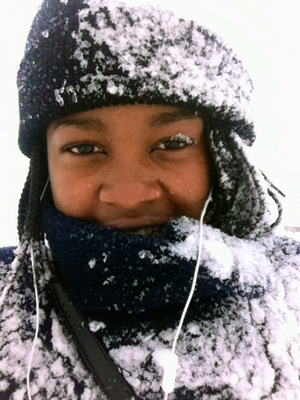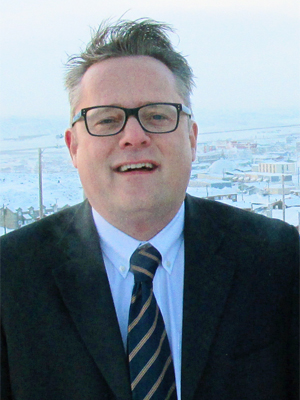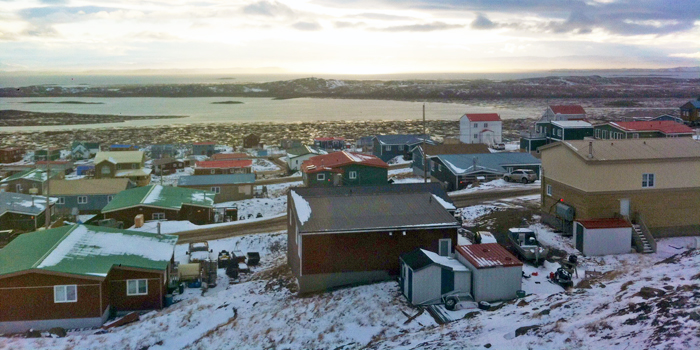Benjamin Flight, Miatta Gorvie and Doug Garson all found their way to Iqaluit after graduation. To hear them tell it, living and working in Nunavut is not that different from working in Montreal or Toronto — save the occasional glimpse of the aurora borealis on the commute home.
BENJAMIN FLIGHT, Crown Counsel, Public Prosecution Service of Canada, Nunavut Regional Office
MIATTA GORVIE, articling at Maliiganik Tukisiiniavik Legal Services (legal aid)
DOUG GARSON, Crown Counsel, Public Prosecution Service of Canada, Nunavut Regional Office
BENJAMIN FLIGHT, Crown Counsel, Public Prosecution Service of Canada, Nunavut Regional Office
1. When did you graduate from McGill and what brought you to Nunavut?
I completed my coursework in December 2012 and graduated in Spring 2013, and I moved to Thunder Bay (Ontario) for my articles. I then came across a job posting with the Public Prosecution Service of Canada in Nunavut. I’d heard that lawyers in the territory get to work on complex cases early on in their careers, so I knew it would be a great learning opportunity. The position appealed both to my wanderlust and my goals for professional development, so I could not resist!
2. How long have you been there and what do you do now?
I’ve been here since September 2014, when the snow was just starting to fall. I’m now Crown Counsel at the Nunavut Regional Office of the Public Prosecution Service of Canada, where I (along with my colleagues) handle cases from the Qiqiktalluk and Kivalliq regions of the territory. The Northern PPSC offices are interesting places to work because they handle the full spectrum of prosecutions. There is no division of labour between the “provincial Crown” (which handles Criminal Code and provincial offences) and the “federal Crown” (which handles federal offences, such as drug charges, regulatory offences, national security, etc.).
Most of my work has been on circuit, which means court sittings anywhere outside of the territorial capital, Iqaluit. I’ve been on circuit in 7 communities thus far. The farthest north I’ve been is to Resolute Bay (around 74°N). Circuit work involves gathering files for a week’s worth of work and loading them all onto a plane. We typically have the weekend before court starts to meet witnesses (and defence counsel has the same amount of time to take instructions from clients), which, in most other places, would be work that could be done well in advance of the court date. It’s challenging work, but those of us working here learn to do all of this very effectively within the tight timelines.
3. Could you share a couple of memorable lessons or moments from your time there?
One memorable moment was when I was on my way back from a circuit with the court party and defence counsel. It was -42°C (n.b., that doesn’t include the windchill) at the point of departure, and the heating system in the plane wasn’t working, so it was a very chilly flight and we were all bundled up in our winter gear. At one point, though, I looked out the window and saw the aurora borealis. I’d never had the experience of seeing the northern lights from the air; the magic of that gave me warmth.
Working here has also been a reminder of the importance of good humour and collegiality. On circuit, you will likely be dining and sharing hotel living spaces with opposing counsel. The courtroom is an adversarial environment, but that is left in the courtroom when the court recesses for the evening. I have fond memories of Crown and defence counsel playing scrabble in between days of trials and contested sentencings. It gives a new meaning to the courtroom term of art, “my friend.”
4. What is the weather like there now and how do you feel about it? Have you picked up any new activities or routines to help you adapt to the environment?
At the time of writing, the temperature is -34°C, and the windchill is -54. As for how I feel about it, it’s great! The days are getting longer right now, by an impressive 6.5 minutes per day. Most winter days here have been clear and sunny, with the occasional blizzard. I haven’t developed any new activities, but I’ve continued skiing and going for long walks. The change for me has been bundling up in heavier winter gear. If one is properly dressed and respectful of the elements (i.e., don’t head out hiking without telling people where you’re going, or in a blizzard; ask people about the risk of polar bear encounters before leaving, etc.), the environment here has a lot to offer. If you love winter, winter will love you back.
MIATTA GORVIE, articling at Maliiganik Tukisiiniavik Legal Services (legal aid)
 1. When did you graduate from McGill and what brought you to Nunavut?
1. When did you graduate from McGill and what brought you to Nunavut?
I graduated in May 2014 and was somewhat disillusioned because I was having trouble finding an articling position that I found socially relevant and fulfilling. I was actually seeking careers outside of law but a McGill professor referred me to a posting from the Law Society of Nunavut. I’m so grateful for the opportunity to work with and for aboriginal people on the challenges of law, poverty and governance in the north.
2. How long have you been there and what do you do now?
I’ve been in Iqaluit since October 2014. I’m currently articling at Maliiganik Tukisiiniavik Legal Services (legal aid) and I will also do rotations with the Law Society of Nunavut and a private lawyer who represents the Kivalliq Inuit Association.
Nalini Vaddapalli, the CEO of the Law Society of Nunavut, has a personal interest in getting law graduates to begin their careers in the territory and was instrumental in helping me set up my articling plan.
3. Could you share a couple of memorable lessons or moments from your time there?
During the first criminal trial that I observed, the witnesses were very frustrated and did not seem to have been properly explained their role in the process. Eventually one witness interrupted the cross-examination and said, “Excuse me, I know I’m not like you guys,” gesturing at the entirely white court party, “but I feel like you’re just going back and forth asking tricky questions, playing mind games with each other.” His comment really exposed the imposition of the Canadian legal system in Nunavut and Inuit people’s need for a justice system that is legitimate and meaningful to them.
4. What is the weather like there now and how do you feel about it? Have you picked up any new activities or routines to help you adapt to the environment?
The darkness was much more difficult to adapt to than the cold but we are gaining more sunlight (and energy!) every day. I do more winter activities and eat more game meat than ever before, but my life here is not so different from when I lived in Montreal. People in Iqaluit are very social and welcoming, and there are always parties, live music, markets, film screenings, and other community events going on.
DOUG GARSON, Crown Counsel, Public Prosecution Service of Canada, Nunavut Regional Office
 I first came to Nunavut after my articles in 1992. For people here that makes me a lifer. I came to Iqaluit partly for adventure and partly because I needed a job. I took a position as a crown attorney with the Department of Justice Canada (now the Public Prosecution Service of Canada). I was in that position for five years, and it involved a lot of flying by small plane to conduct criminal prosecutions in all of the little communities in the Eastern Arctic.
I first came to Nunavut after my articles in 1992. For people here that makes me a lifer. I came to Iqaluit partly for adventure and partly because I needed a job. I took a position as a crown attorney with the Department of Justice Canada (now the Public Prosecution Service of Canada). I was in that position for five years, and it involved a lot of flying by small plane to conduct criminal prosecutions in all of the little communities in the Eastern Arctic.
In 1998, I became excited about the creation of Nunavut and I accepted a position with the new territorial government. I enjoyed my experience with the government of Nunavut, and the last position I held there was Assistant Deputy Attorney General from 2008-2010. After that, my career went full circle and I came back to where I started as a crown prosecutor with what is now the PPSC.
The winters are cold, but they don’t seem to be quite as cold as they were in my earlier days here. The winters now remind me of those I experienced growing up in Winnipeg with the only difference being that they last longer. People in Nunavut dress for the weather and are less concerned about a fashion statement.
There have been so many memorable moments over the years. One that quickly comes to mind was being out caribou hunting with Dennis Paterson, a former premier of the NWT and current senator. We had a very successful hunt but, on the way back, we got caught in a blizzard so fierce that you couldn’t see your hands in front of your face. Just when we had resigned ourselves to spending the night huddled together on our Qamotiq (sled), an experienced Inuk hunter found us and guided us home. This hunter had such a profound understanding of the land that he didn’t even need to see in order to take us back to town.
[ JUMP TO THE CURRENT EDITION OF FOCUS ONLINE ]

